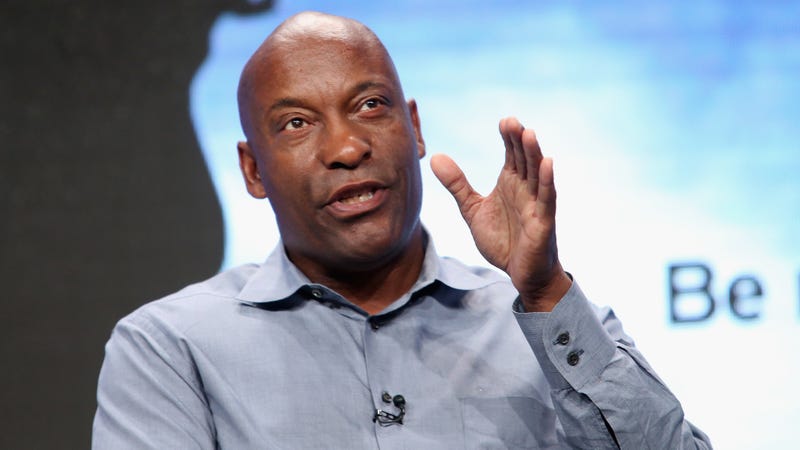
Snowfall is proof that, more than 25 years after breaking through with his Oscar-nominated debut film, Boyz n the Hood, John Singleton hasn’t forgotten his roots and, most importantly, his responsibility.
Different from Rebel, Singleton’s first scripted television show as an executive producer for BET earlier this year, Snowfall digs deep, very deep. Whereas Rebel, with a woman orchestrating the beatdowns, struck more as a modern-day re-imagining of the iconic Shaft (which Singleton revamped on the big screen with Samuel L. Jackson nearly 20 years ago), Snowfall raises the stakes considerably. Singleton, who co-created the series, aims to tell the story of one of the most devastating eras in modern black American history—the crack cocaine period. And for the Los Angeles native, this story is very personal.
“For me it’s something that has affected so many different people’s lives, that transition from cocaine being a recreational drug for the very well-to-do to it turning into crack, an epidemic that basically affected our communities with people being addicted and also selling and also changing the drug laws so they can put a whole generation of us in prison,” he told The Rootexclusively via telephone during an Uber ride in L.A. “So it’s really kind of a horror story as far as I’m concerned because, when you talk about crack, it’s like World War II for black people if you lived it.”
“They say it’s the only thing that made black women leave their children,” he says of the epidemic. “Slavery didn’t do it. Jim Crow didn’t do it, but crack did it.”
A lot of Snowfall is a prequel to the crack plague. It’s a different time, one with a slight touch of innocence. The music is even different. “Hip-Hop hadn’t hit yet,” says Singleton of the early ’80s-era series. “We were all into funk records—Gap Band, Lakeside, Rufus and Chaka Khan—and that’s what the show reflects.”
The character of Franklin Saint, a star-turn for England’s latest theatrical import, Damson Idris, is a bright teenager who has foregone college away to stick close to his mother, Cissy Saint (The Wire alum Michael Hyatt). In addition to holding down a basic job, he sells weed for his uncle Jerome (Amin Joseph), his mother’s brother. But Franklin has grander ambitions. Busing to a better school puts him in circles he never could have accessed. He sees an opportunity to grow rich in the new drug game with some of the purest cocaine around. Naivete is his biggest mistake, however.
Because it’s L.A., there’s a Latinx story to tell as well. At the same time Franklin is making moves, so is Lucia Villanueva, played by Emily Rios of Friday Night Lights and Breaking Bad fame. Daring to carve out a role for herself in the family’s drug cartel, Lucia leans on Gustavo (Sergio Peris-Mencheta), a frustrated wrestler seeking a better life. And in the middle of it all is the CIA and the controversial claim that the federal agency helped finance the war in Nicaragua by flooding L.A.’s black community with cheap and potent cocaine. Pulitzer Prize-winning journalist Gary Webb exposed this connection in a three-part series that ran in the San Jose Mercury News in 1996 but was later discredited and reportedly pushed out of journalism. Webb’s 2004 death by two gunshots to the head was ruled a suicide.
“There’s not a lot of stuff written about this time, especially on the West Coast,” says Singleton. “You have stuff on the East Coast and definitely in the Latin culture, in South Florida.” That didn’t deter Singleton, his co-creatorEric Amadio and the rest of the team from telling a story that Singleton deems vital.
“People seem to think ‘OK, hey, cocaine is so, so sexy, but crack, crack is not sexy. It’s wack,” he chuckles, without drowning out the seriousness of his words. “Crack has never been sexy but you’re going to see that transition and how dangerous it gets getting into the game [in Snowfall]. Cocaine is always glamorized in certain ways but this story has never ever been told before. Ever,” he reemphasizes.
FX got a lot of our attention last year with the Award-winning series, The People v. O.J. Simpson: American Crime Story, which garnered Singleton his first Emmy nomination for directing its critical “Race Card” episode. There is a cinematic feel to Snowfall that feeds the growing intensity of each episode. Snowfall also pushes the limits, explained Singleton. “There’s partial nudity. There’s cursing. It’s a little more violent than usual,” he noted while flanked by most of Snowfall’s cast at last month’s American Black Film Festival in Miami.
Back in L.A., Singleton dismisses descriptions of Snowfall as “The Wire meets Narcos,” insisting that that’s “an easy generalization,” adding that Snowfall is “nothing like either one of those shows.” Although he emphasizes, “those are great shows,” he says Snowfall is “its own thing.”
Singleton will cop to Snowfall being “the ghetto Game of Thrones,” crediting his largely, unknown cast for helping him achieve that effect. “These new faces work so well because you don’t know where it’s going to go,” he says. “You don’t know who’s expendable, who’s going to make it through.”
Snowfall debuts Wednesday at 10 p.m. on FX.


